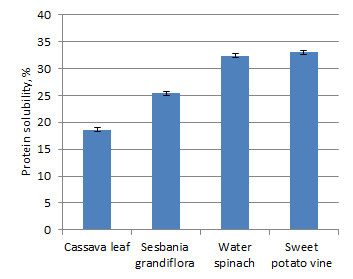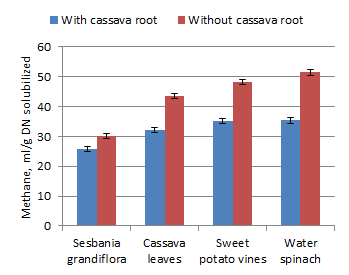 |
 |
| Figure 1. Protein solubility leaves of cassava, Sesbania grandiflora, water spinach and Sweet potato vine | Figure 2. Methane production from leaves of cassava, Sesbania grandiflora, water spinach and sweet potato vine |
|
Livestock-Based Farming Systems, Renewable Resources and the Environment |
This study included three experiments with the objectives to determine the protein solubility of cassava leaf, foliage of Sesbania grandiflora and water spinach, and sweet potato vine and to study effect of these feed resources on methane production in an in vitro incubation system with or without cassava root meal as substrate. In experiment 1, the treatments in a completely randomized design with three replications were: Cassava foliage (CF), Sesbania foliage (SF), Water spinach (WS), and Sweet potato vines (SP). Nitrogen solubility was low for SF and CF and high for WS and SP (Figure 1). In Experiment 2, an in vitro incubation system was used to evaluate effects on methane production of the following treatments in a completely randomized design with three replications: Cassava foliage (CF), Sesbania foliage (SF), Water spinach (WS), and Sweet potato vines (SP). The quantity of substrate used was 2 g to which were added 40 ml rumen fluid (from rumen-fistulated cattle) and 160 ml buffer solution. The incubation was 24 hour with measurements of total gas production, percent methane and substrate fermented. The gas production and methane production per unit DM fermented were lowest on the foliages with lowest solubility of the protein. In Experiment 3, an in vitro incubation system was used to evaluate the following treatments in a a completely randomized design with three replications; Cassava foliage (CF), Sesbania foliage (SF), Water spinach (WS), Sweet potato vines (SP). All treatments had cassava root meal as fermentable carbohydrate. The procedure was the same as for experiment 2. The percent methane in the gas and methane volume per unit DM fermented had the same trend as in experiment 2. However, the methane percentage and methane production per unit DM fermented were reduced when cassava root meal was present in the substrate compared with no cassava root (Figure 2).
Key words: Gas production, methane percentage, cassava root meal.
 |
 |
| Figure 1. Protein solubility leaves of cassava, Sesbania grandiflora, water spinach and Sweet potato vine | Figure 2. Methane production from leaves of cassava, Sesbania grandiflora, water spinach and sweet potato vine |